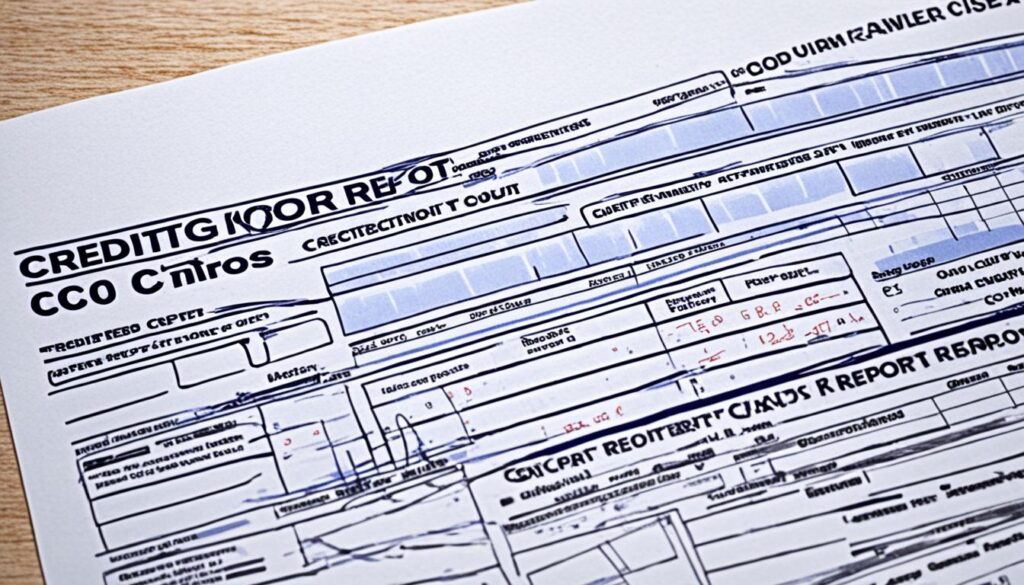Maintaining a healthy credit score is essential for securing favorable loan terms, renting an apartment, or even landing a job. However, life’s financial challenges can sometimes lead to negative items on your credit report, dragging down your credit score. The good news is that you don’t need to rely on expensive credit repair companies to fix your credit. With a little time and effort, you can tackle credit repair on your own and see significant improvements in your credit profile.
Key Takeaways
- DIY credit repair can be an effective and cost-saving approach to improving your credit score
- Obtain copies of your credit reports to identify and dispute any errors or inaccuracies
- Address late payments and reduce outstanding debts to improve your credit utilization ratio
- Open a credit-building credit card and use it responsibly to establish positive credit history
- Be patient and consistent in your credit repair efforts to see long-term improvements
Get Copies of Your Credit Reports
Obtaining copies of your credit reports from the three major bureaus – Equifax, Experian, and TransUnion – is the first crucial step in successful credit repair. These reports contain detailed information about your credit history, including your credit score factors and any potential credit report details that may be affecting your creditworthiness. By reviewing your reports, you can identify any inaccuracies or negative items that need to be addressed.
How to Obtain Your Credit Reports
Fortunately, you can obtain credit reports easily and for free. Each year, you are entitled to one free credit report from each of the three major bureaus. During the COVID-19 pandemic, you can access one free report per week from each bureau until December 2023. To request your reports, you’ll need to provide some basic personal information, such as your full name, phone number, address, date of birth, and Social Security number.
- Visit AnnualCreditReport.com to request your free reports.
- Contact each credit bureau directly to obtain your reports.
- Consider using a credit monitoring service to access your reports regularly.
Reviewing your credit report details is a crucial first step in taking control of your financial health and improving your credit score factors. By obtaining and closely examining your credit reports, you can identify any errors or negative items that may be dragging down your score and take the necessary steps to address them.
“Knowledge is power when it comes to your credit. Obtaining your credit reports is the first step in taking control of your financial future.”
Review Your Credit Reports for Errors
To take charge of your credit, it’s essential to thoroughly review your credit reports for any discrepancies or negative items that may be impacting your credit score. Your credit score is calculated based on several key factors, including your payment history, credit utilization, length of credit history, and credit mix.
By closely examining your credit reports, you can identify and address any inaccuracies or negative items that may be dragging down your credit score. This could include incorrect account statuses, accounts you don’t recognize, or missed payments that shouldn’t be on your report.
To get started, you can access your credit reports from the three major credit bureaus – Experian, Equifax, and TransUnion – for free once a year at AnnualCreditReport.com. Review each report carefully, and make note of any credit score factors that need attention.
- Check for accounts you don’t recognize or that have incorrect statuses
- Look for missed payments or derogatory information that shouldn’t be on your report
- Ensure that your personal information, such as your name and address, is accurate
By taking the time to review your credit reports and identify negative items, you can take the first step towards improving your credit score and achieving your financial goals.

“Regularly reviewing your credit reports is a crucial step in maintaining a healthy credit profile. It’s the best way to catch and correct any errors that could be dragging down your score.”
Dispute Inaccuracies with Credit Bureaus
If you spot errors on your credit report, such as accounts that don’t belong to you or an incorrect payment history, you can dispute the inaccuracies with each credit reporting agency. The credit bureaus are obligated to investigate the disputed information, reach out to the lender or credit card issuer reporting it, and provide you with the results of their investigation.
The credit bureau dispute process is straightforward and can be initiated online, by mail, or over the phone. Here’s a step-by-step guide on how to dispute credit report errors:
- Obtain a copy of your credit report from Equifax, Experian, and TransUnion.
- Carefully review each report for any inaccuracies or discrepancies.
- Gather supporting documentation, such as bank statements or payment records, to substantiate your claim.
- Contact the credit bureaus directly to initiate the dispute process. You can do this by filling out an online form, sending a letter by mail, or making a phone call.
- Provide a detailed explanation of the errors and submit your supporting evidence.
- The credit bureau will investigate the disputed information and respond to you within 30-45 days.
If the credit bureau’s investigation confirms the inaccuracy, they are required to correct the error on your credit report. This can have a significant impact on your credit score and overall financial well-being.
| Credit Bureau | Dispute Process |
|---|---|
| Equifax | Online, Mail, Phone |
| Experian | Online, Mail, Phone |
| TransUnion | Online, Mail, Phone |
By taking the time to dispute credit report errors, you can ensure your credit profile accurately reflects your financial history, ultimately leading to better credit-related opportunities in the future.

Address Late Payments
Tackling late payments is a crucial step in improving your credit score. Late or missed payments can have a significant impact on your credit history, dragging down your overall creditworthiness. The sooner you address these delinquencies, the better it will be for your financial standing.
Here are some effective strategies to address late payments on your credit report:
- Communicate with your lenders: Reach out to your creditors as soon as possible after missing a payment. Explain your situation and see if they are willing to waive the late fee or forgive the missed payment, especially if it’s your first instance. Many lenders are open to working with responsible borrowers.
- Make a partial payment: Even if you can’t make the full payment right away, making a partial payment can help mitigate the impact on your credit score. This demonstrates your commitment to addressing the issue.
- Set up automatic payments: Consider setting up automatic payments from your bank account to ensure you never miss a due date. This can help prevent future late payments and maintain a positive payment history.
- Monitor your credit reports: Regularly review your credit reports to ensure that any late payments are accurately reported. If you find inaccuracies, dispute them with the credit bureaus to have them corrected.
By addressing late payments promptly and proactively, you can minimize the negative impact on your credit score and maintain a strong payment history. This, in turn, can help you build a more favorable credit profile and access better financial opportunities in the future.
| Impact of Late Payments | Duration on Credit Report |
|---|---|
| 30-day late payment | Up to 7 years |
| 60-day late payment | Up to 7 years |
| 90-day late payment | Up to 7 years |
| Charge-off | Up to 7 years |
Remember, addressing late payments is a crucial step in your credit repair journey. By taking proactive measures, you can mitigate the long-term impact on your credit score and set yourself up for financial success.

DIY Credit Repair Tips: Pay Down Debts
Tackling your outstanding debts is a crucial step in improving your credit score. Your credit utilization, which is the amount of credit you are using compared to the amount available to you, has a significant impact on your creditworthiness. Maintaining a credit utilization ratio below 30% can give your credit score a substantial boost.
There are several effective debt payoff methods you can employ to pay down your debts and improve your credit profile. The debt avalanche method focuses on targeting high-interest accounts first, while the debt snowball method prioritizes paying off the accounts with the smallest balances.
- The debt avalanche method helps you save the most on interest by directing your payments towards the debts with the highest interest rates.
- The debt snowball method provides a sense of momentum and accomplishment as you systematically pay off your smaller debts, which can be especially motivating.
In addition to these debt payoff strategies, opening a credit repair credit card, such as a secured credit card, can also contribute to building your credit history and demonstrating your ability to make on-time payments.
| Debt Payoff Method | Advantage |
|---|---|
| Debt Avalanche | Saves the most on interest |
| Debt Snowball | Provides a sense of momentum and accomplishment |
By consistently paying down your debts using these strategies and maintaining a low credit utilization ratio, you can take significant strides towards improving your credit score and financial well-being.

Open a Credit Repair Credit Card
In your journey to rebuild your credit, opening a credit repair credit card can be a game-changer. These specialized cards are designed to help individuals with poor or limited credit history improve their creditworthiness. By using a credit repair credit card responsibly, you can start building a positive credit history and gradually increase your credit score.
Here are some key benefits of using a credit repair credit card:
- Easier Approval – Credit repair cards typically have more lenient approval criteria, making them accessible to those with poor or no credit history.
- Reporting to Credit Bureaus – Your on-time payments and responsible usage of a credit repair card will be reported to the major credit bureaus, helping to establish and improve your credit profile.
- Secured or Unsecured Options – You can choose between a secured credit card, which requires a refundable security deposit, or an unsecured credit repair card, which doesn’t require a deposit.
- Reasonable Fees – While credit repair cards may have some fees, such as annual fees or processing fees, these are typically lower than those associated with subprime or payday loans.
When selecting a credit repair credit card, it’s important to do your research and compare offers from different providers. Look for cards with low or no annual fees, reasonable interest rates, and a clear path to transitioning to a standard credit card as your credit score improves.
Remember, the key to success with a credit repair credit card is to use it responsibly by making on-time payments and keeping your credit utilization low. With consistent, positive credit behavior, you can gradually rebuild your credit and open the door to more favorable financial opportunities in the future.
Secured Credit Cards for Credit Building
If you have a history of missed payments or limited credit history, opening a new credit builder card can be a useful strategy for improving your credit score. Secured credit cards, which require a refundable deposit that serves as your credit limit, can help you demonstrate your responsibility as a borrower and build your credit history.
One popular option for secured credit cards is the Secured Chime Credit Builder Visa® Credit Card. This card allows you to make a refundable security deposit of $200 to $1,000, which becomes your credit limit. As you use the card responsibly and make on-time payments, Chime reports your activity to the major credit bureaus, helping to establish and improve your credit building over time.
Another benefit of secured cards like the Chime card is that they often come with additional features to support your credit repair journey, such as free credit monitoring, no annual fees, and the opportunity to upgrade to an unsecured card after demonstrating responsible usage.
| Feature | Secured Chime Credit Builder Visa® Credit Card |
|---|---|
| Security Deposit | $200 to $1,000 |
| Credit Limit | Equal to Security Deposit |
| Annual Fee | None |
| Credit Reporting | Reported to Major Credit Bureaus |
| Upgrade to Unsecured | Possible After Responsible Usage |
By using a secured credit repair credit card like the Chime card and making on-time payments, you can gradually build a positive credit history and potentially improve your credit score over time. This can be a valuable tool in your overall credit building strategy.
Develop Positive Credit Habits
Establishing and maintaining positive credit habits is crucial for sustainable credit repair. As you work to improve your credit score, focus on creating a budget, making timely payments, and regularly monitoring your credit reports. By developing these essential practices, you can set yourself up for long-term financial success.
Create a Budget and Stick to It
Crafting a realistic budget is the foundation of positive credit habits. Take the time to review your income and expenses, then allocate funds towards your essential bills and debt payments. This proactive approach ensures you make on-time payments, a key factor in maintaining a healthy credit profile.
Monitor Your Credit Reports Regularly
Regularly reviewing your credit reports is vital for identifying and addressing any inaccuracies or fraudulent activity. By monitoring your credit, you can quickly catch and dispute errors, ensuring your credit report reflects your true financial standing.
Avoid Unnecessary Credit Applications
Each time you apply for new credit, a hard inquiry is placed on your credit report, which can temporarily lower your credit score. To maintain positive credit habits, be mindful of your credit applications and only pursue new credit when it is truly necessary.
“Developing positive credit habits is the key to sustainable credit repair. By budgeting, monitoring your credit, and exercising restraint with new credit applications, you’ll be well on your way to a stronger financial future.”
Remember, building a strong credit profile takes time and consistency. By incorporating these positive credit habits into your daily routine, you’ll be on the path to achieving your financial goals.
Be Patient and Consistent
Repairing your credit can be a marathon, not a sprint. It’s important to understand that the credit repair timeline can vary significantly, often taking several months or even years, depending on the specific negative items you’re working to remove. The key is to approach the process with consistent financial habits and unwavering patience.
Improving your credit score is not an overnight transformation. It requires diligence, dedication, and a commitment to responsible financial practices. By persistently addressing any inaccuracies or delinquencies on your credit reports, you can steadily climb the path to better credit health.
- Remain consistent in making timely payments on all your bills and obligations.
- Regularly monitor your credit reports for any changes or updates.
- Dispute any negative items you believe to be inaccurate or unwarranted.
- Gradually pay down your debts to improve your credit utilization ratio.
- Cultivate consistent financial habits that demonstrate your creditworthiness.
With patience and persistence, you can overcome credit challenges and rebuild your credit profile over time. Remember, the journey may not be quick, but with diligent effort, you can achieve your long-term financial goals.
“The road to better credit may be long, but with dedication and consistency, the destination is within reach.”
Track Your Progress
As you work to repair your credit, it’s essential to monitor your progress regularly. By checking your credit score monthly, you can track the improvements in your score and identify any areas that still need attention. Regularly reviewing your credit reports and scores will help you stay on top of your credit health and ensure that your efforts are paying off.
Consistent credit score monitoring is the key to maintaining a healthy credit profile. By keeping a close eye on your credit information, you can quickly spot any errors or suspicious activity and take prompt action to address them. This proactive approach will not only help you achieve your credit improvement tracking goals but also protect your financial well-being in the long run.
Remember, credit repair is a journey, not a destination. Stay patient, persistent, and committed to your financial goals. By tracking your progress and making incremental improvements, you’ll be well on your way to a stronger, more stable credit profile that will open doors to better opportunities in the future.
FAQ
How can I obtain copies of my credit reports?
How can I review my credit reports for errors?
What is the process for disputing inaccuracies on my credit report?
How can I address late or missed payments on my credit report?
What are some effective methods for paying down debt?
How can a secured credit card help with credit building?
What are some positive credit habits I should develop?
How long does it take to repair my credit?
How can I track my credit repair progress?
Source Links
- DIY Credit Repair 101: A Beginner’s Guide to Fixing Your Credit – https://financebuzz.com/diy-credit-repair
- How To Fix Your Credit In 7 Easy Steps – https://www.forbes.com/advisor/credit-score/how-to-fix-your-credit/
- 13 ways to fix your credit by yourself – https://www.creditrepair.com/blog/credit-repair/repair-your-credit-yourself/

